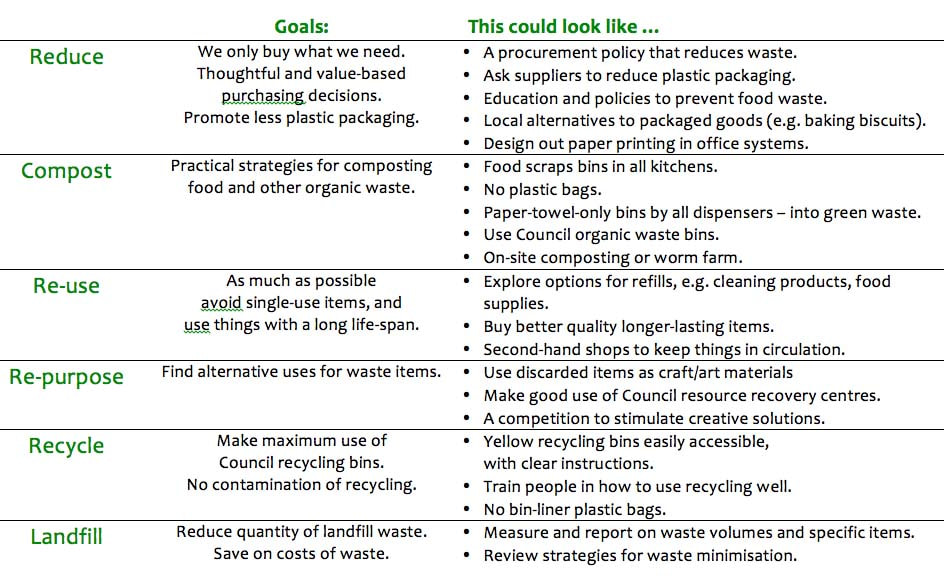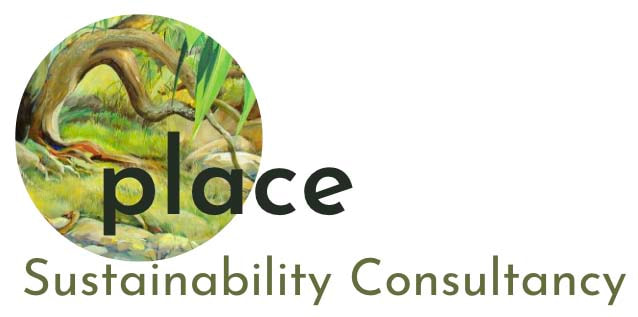WasteThere's no getting away from it - we have to deal with our own rubbish. Every regional Council is asking every household and every organisation to reduce what it throws away.
This means choices about what we buy as well as good systems for what people do with an item they no longer want. Your organisation needs to look at your waste stream ... what comes into your buildings and what goes out. As you do this you will be encouraging better choices for all your clients and members, with positive flow-on effects into their homes and families. |
Reducing Waste in Community Agencies
"Less Waste: The Waste Hierarchy" - download HERE
"Reducing Waste in Community Agencies: A Process Guide" - download HERE
There are various aspects to how to cut down the waste going to landfill from your facilities.
There is no set process or order to do things, but these all help ... a helpful chart.
There are various aspects to how to cut down the waste going to landfill from your facilities.
There is no set process or order to do things, but these all help ... a helpful chart.
Zero Waste
Partner with a zero waste organisation:
Para Kore began in Raglan and has worked with hundreds of marae, schools and community groups. Their website is packed with inspiration, videos and practical resources. Any organisation in the North Island can join up with them for free and receive their advice, facilitation, education. Resources are bilingual and specifically designed to fit with NZ recycling systems.
Para Kore began in Raglan and has worked with hundreds of marae, schools and community groups. Their website is packed with inspiration, videos and practical resources. Any organisation in the North Island can join up with them for free and receive their advice, facilitation, education. Resources are bilingual and specifically designed to fit with NZ recycling systems.
Purchasing Policy
Developing a Purchasing Policy for your organisation helps you identify your values.
Decisions about enviro-friendly purchasing are not always clear-cut. Will you pay more for a more eco option? If you have to choose between a local item or a recycled item which is more important to you?
- Buy local to reduce carbon emissions
- Buy organic as more healthy
- Buy chemical-free to reduce pollution
- Buy recycled products to reduce waste in production
- Buy recyclable and reusable products to reduce waste in the long term
Decisions about enviro-friendly purchasing are not always clear-cut. Will you pay more for a more eco option? If you have to choose between a local item or a recycled item which is more important to you?
- Buy local to reduce carbon emissions
- Buy organic as more healthy
- Buy chemical-free to reduce pollution
- Buy recycled products to reduce waste in production
- Buy recyclable and reusable products to reduce waste in the long term
Comment on Procurement Policy: Go Well Consulting
Have a procurement policy or supplier code of conduct that asks your suppliers (or potential suppliers) what strategies they have in place to reduce their emissions and communicates yours. The power of influence cannot be underestimated. Just by asking, you are making other businesses address the issue. And the more they are asked, the more motivation they will have to do something tangible.
Have a procurement policy or supplier code of conduct that asks your suppliers (or potential suppliers) what strategies they have in place to reduce their emissions and communicates yours. The power of influence cannot be underestimated. Just by asking, you are making other businesses address the issue. And the more they are asked, the more motivation they will have to do something tangible.
Up the Supply Chain: Consumer advocacy
For those items that you need, that cannot be recycled or composted, your power is your consumer voice.
Make a list of five items you purchase which are a landfill problem.
Identify a) who supplies you, and
b) who manufactures the item.
Write a letter to each supplier and manufacturer asking about their plans to reduce their products' impact on landfill waste.
Make a list of five items you purchase which are a landfill problem.
Identify a) who supplies you, and
b) who manufactures the item.
Write a letter to each supplier and manufacturer asking about their plans to reduce their products' impact on landfill waste.
Op Shop Waste
Charities make money from other people's waste. It's great. Who doesn't love op-shopping?!
The down-side is, an opshop handles a huge amount of rubbish. This can be an enormous cost. It is also a great opportunity to recycle.
Let's develop a collective set of best practice principles to help opshops reduce how much goes in the skip bin.
The down-side is, an opshop handles a huge amount of rubbish. This can be an enormous cost. It is also a great opportunity to recycle.
Let's develop a collective set of best practice principles to help opshops reduce how much goes in the skip bin.


